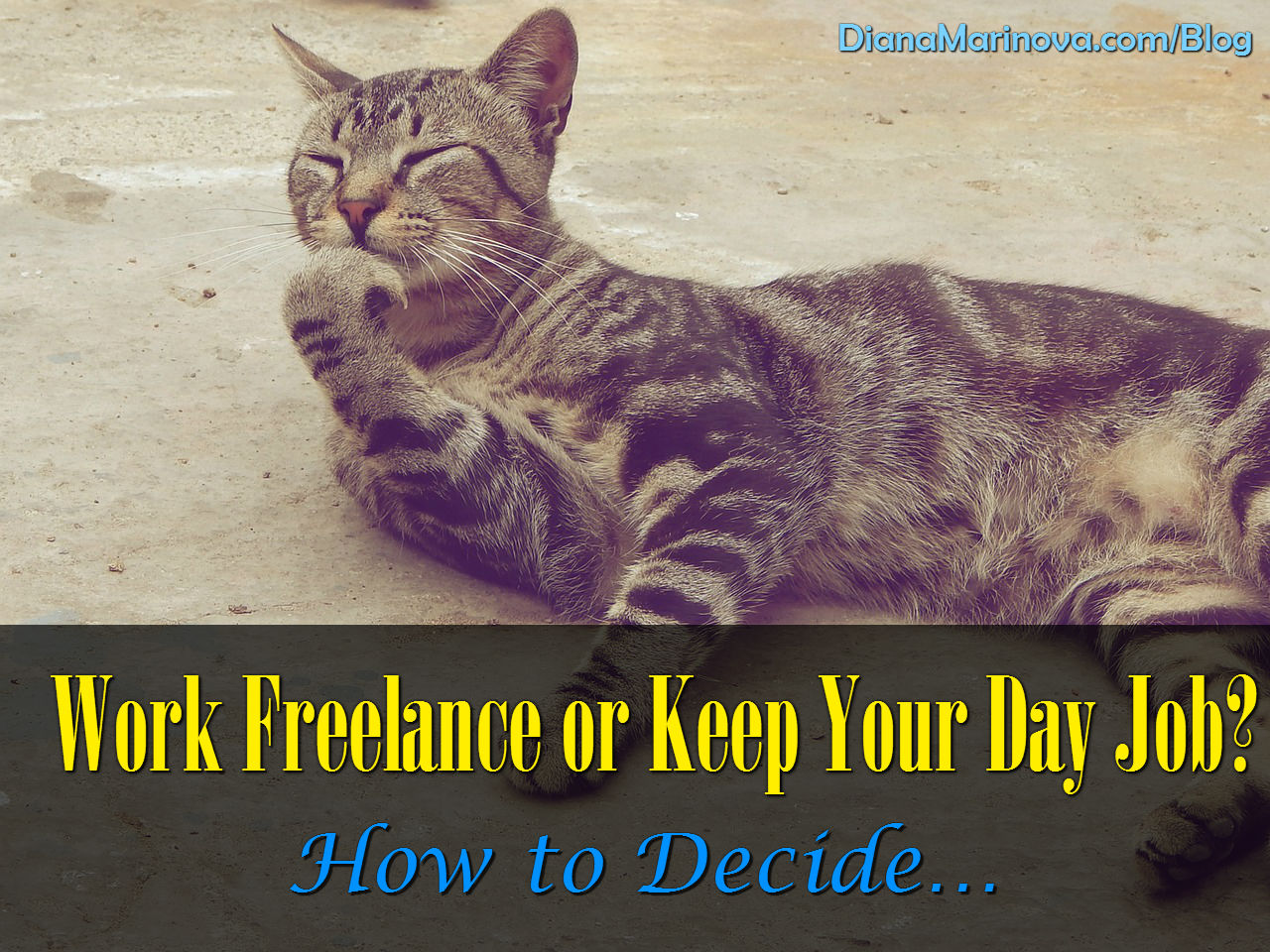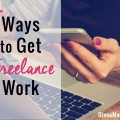 Many of my blog readers email with all sorts of questions – to name a few: ‘where do I begin’, ‘what should I do’, ‘can I make more money as a freelancer than at my day job’, ‘how hard is it to be a freelancer’, and so on, and so forth.
Many of my blog readers email with all sorts of questions – to name a few: ‘where do I begin’, ‘what should I do’, ‘can I make more money as a freelancer than at my day job’, ‘how hard is it to be a freelancer’, and so on, and so forth.
Obviously, they are hesitant to make the transition from their day job to a full-time freelance practice, and that’s understandable. However, the answers to these questions depend pretty much on the individual situation of each person. So I thought I’d give you a methodical approach to finding the answers on your own before you make the leap from 9-to-5 employment to being a freelancer.
First, ask yourself some questions.
Too many people fail because they went freelance for the wrong reasons, weren’t prepared for the journey, or simply had the wrong idea of what being a freelancer really is.
The top five questions I suggest you ask yourself are:
- Why do you want to become a freelancer?
- What do you expect of being a freelancer?
- What are your long-term plans?
- Do you have what it takes to succeed as a freelancer?
- Do you have the support of your friends and family? (And I am not talking about financial support here…)
For details about each question, how to answer it, and what to make of it all, check out the post “5 Questions to Ask Yourself before You Go Freelance”.
Second, make sure you know what you’re getting into.
Well, wait, this is misleading. You will never really know what you’re getting into until you’re already neck-deep into the water 😉 But that’s not necessarily bad – there’s no better teacher than life, right?
Nevertheless, you should think about the good and bad sides of being a freelancer such as:
- You are responsible for planning your time – this could be good or bad, depending on the type of person you are.
- You can follow your inspiration whenever it hits.
- You can work on multiple projects at once – if you want variety in your work, that is.
- You can travel more often, if you want to.
- You can take better care of yourself (incl. healthy eating and regular exercise) because … remember number one? Yes, you are responsible for your time planning and you can have as much time as you want for grocery shopping, cooking or physical activities.
- You no longer have to hang out with your co-workers – which again can be good or bad depending on the type of person you are. Social isolation is a myth in my book but many freelancers fall victim of it as soon as they quit their day jobs. So beware!
For more details about each of these pros and cons, check out the post “7 Working from Home Pros and Cons”. Be sure to also check the internal links in it – they will lead you to more posts about various aspects of the freelance lifestyle such as social isolation, work-life balance, popular myths about freelance, and more.
Third, don’t fool yourself – freelance does not equal quick and easy money.
Being a freelancer equals self-discipline, good planning, and superb time management. It also equals determination, persistence, and patience. Not to mention you’d need to figure out your work principles and to stick with them, no matter what!
Being a freelancer is super hard sometimes – but it’s worth it, if you do it right.
For details on why being a freelancer does not equal quick and easy money, check out the post “Being a Freelancer – Is It Hard”. As usual, be sure to follow the internal links which will lead you to more relevant posts – for example, about starting as a freelancer or work principles.
If you are determined to succeed as a freelancer but don’t know how to start just yet, I have just the thing for you …
Have you heard of Upwork (formerly oDesk) and Elance? Those two sites could be a good start for everyone, regardless their profession or location.
I released a brand new book outlining the seven steps you need to take to lay a solid foundation for your online business on those two sites. Furthermore, I share some hard truths that you need to know as early as now, in order to succeed as a freelancer.





Great advice Diana, but…been there, done that.
Thanks, Xerxeska, but why the “but”? Many people have not been there and have not done that and for those who have, I sure hope it was at least a good reminder 😉
~Diana
Hey, Diana. All I meant was that I’ve been in this situation and made my decision. Nothing more, nothing less. For those who haven’t yet decided which fork to take, your blog is a life changing map.
You are a true friend, philosopher and guide.
Xerxes (without ka)
My opinion is that you’ve created the perfect tool to answer all of these questions…I know because I read the book and loved it.
Right, I continue getting the same questions via email so I must have not communicated well that many of the answers are in the book – ha-ha! Thanks for your support, Jacquie 😀
Hi, Diana. I am not in the US celebrating the 4th of July. I did not postpone reading your post till next week. I just finished reading it. This is what I have to say:
Reading your post gave me a sense of ‘Deja vu’. I had asked myself similar questions before I switched to being a freelancer. But for me, the answers were relatively easy. I was doing exactly what I am doing now. Writing copy for advertising agencies but as a non-freelancer. So, all I had to do, when it was time to quit, was to eliminate the prefix ‘non’.Today, I am the owner of a writing service which, among other things writes, you guessed it, copy for several agencies. However, for those who are just dipping their toes in the unknown waters of the freelance pool, your advice can make the difference between sink or swim.
Copy that? .
thanks for sharing your story, Xerxeska – and for reading and leaving a comment, twice 😉
Diana — to become a freelancer you must be able to live with ambiguity. It’s an uncertain life and not for the faint of heart. If you can’t stand not having a weekly paycheck, freelancing is not for you.
Thank for the great addition, Jeannette – it definitely isn’t for the faint of heart. As for uncertainty – I’ll agree with you if we paraphrase because there can be certainty in being a freelancer. The certainty is in your hands, not in any one employer – that’s the difference. You depend on you, period. Stuff happens, clients will come and go but if you have gotten your ducks in a row, you wouldn’t feel uncertainty as a freelancer from one point onward, ever.
Hi Diana,
I liked your article and the way you presented it.
In your 2nd point you can clearly mentioned on what you’re getting into. However in your 4th point, you haven’t mentioned much on how to start your career as a freelancer. I guess, the Amazon link is the answer.
For those who came late, we can say that networking website such as oDesk, Elance, GuruFace is good to start. Email campaigns and word of mouth referral are another good strategies to get started.
You’re right, Hobbes S Sujith, my book (available on Amazon) can answer all your questions about starting your freelance career on Upwork and Elance (and similar sites for that matter). Let me know what you think, if you happen to grab a copy.
~Diana
If it helps, your readers can check my blog post on 13 Freelance Myths (blog.guruface.com/freelance-myths/) in which I have explained about how to get clients from networking wesites (more in-depth details can be received from your book available at Amazon), email marketing campaigns, and word of mouth referral.
Hoping that my blog post would help your readers.
Thanks for sharing your blog post, Hobbes – I didn’t care much about the section of email marketing and word of mouth referral because you don’t really explain anything there, just mentioning them as a way of attracting new clients.
However, the post could be benefitial to my reders indeed because your myths could help them better understand what they are getting into and as a result, decide if they are cut out for the freelance lifestyle or not. Thanks for sharing!
~Diana
Hi Diana. Thanks for this. As the freelancing industry continues to grow in leaps and bounds, more and more people are jumping into the bandwagon. What I have discovered though, is that some people think it’s easy. We just sit at home in our pajamas, log in and the money comes flying out. Not true. It takes dedication, consistency, planning and a sticktoit attitude. But it’s well worth it 🙂
Well said, Sheeroh – thanks for stopping by 😀
~Diana
Now I’m combining these two occupations and I’m ok with it. Though I want to switch to freelancing completely as soon as I’ll have a constant customer flow. Do you know some sites where this flow can be found?)
Hi, Helen – kudos to you for successfully combining a day job with freelancing, I never could do that 🙂
As for your question – I used to get a steady workflow from clients on oDesk (now Upwork) and Elance. I see you are a writer, and I know there are MANY forums and platforms, offering job postings, and many writers have managed to find a steady workflow there. Unfortunately, I cannot recommend any from personal experience.
I have heard writers share positive feedback about problogger job forum and also, you can check out Sophie Lizard’s forum and jobs section (it is being upgraded right now apparently). I suggest you connect with fellow writers and ask them for their experience with various writing platforms.
Hope this helps!
~Diana